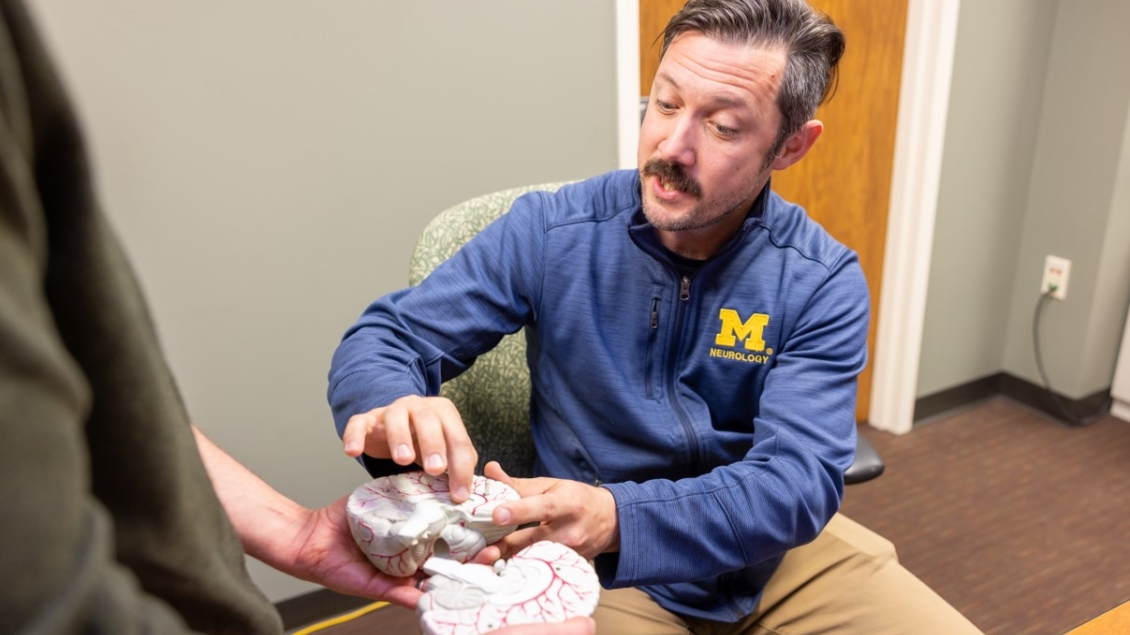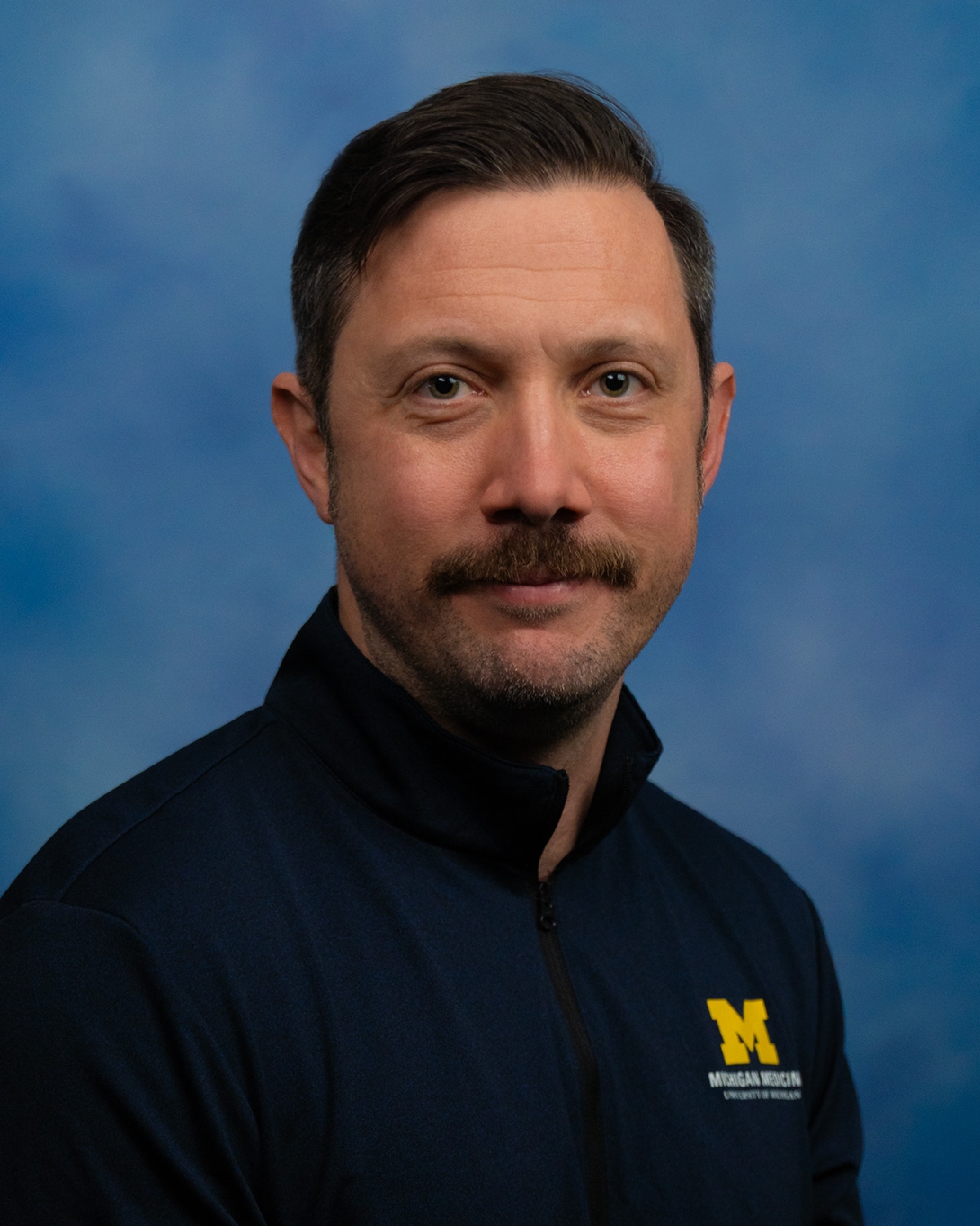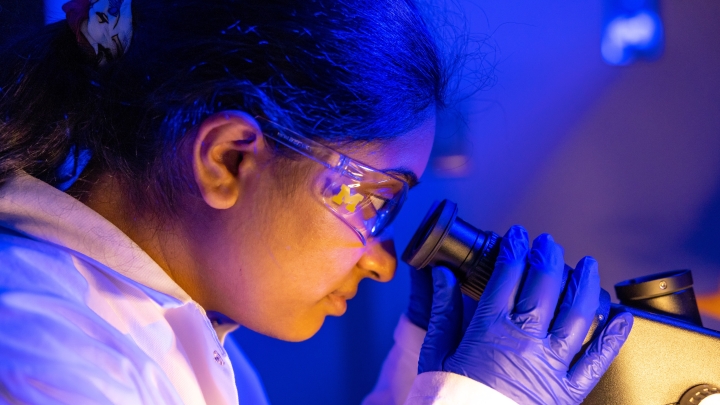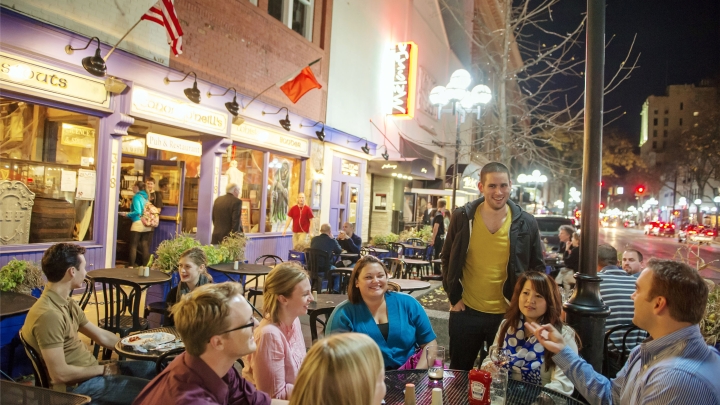
We are proud to offer a two year, comprehensive movement disorders training program that draws from a wealth of clinical, research and educational opportunities made available here at the U-M Medical School Department of Neurology.
Year one immerses you in diverse clinical experiences from deep brain stimulation to specialized clinics like neurogenetics and Wilson’s Disease.
Year two is all about you, tailored to your academic passions, be it advanced clinical expertise, educator programs, or cutting-edge research. Elevate your career with guidance from our esteemed faculty.
The University of Michigan has been actively training movement disorders specialists since 1987. Since assuming the role of our program’s director in 2019, I’ve continued to build upon our program’s rich history, leveraging an abundance of resources including but not limited to a wealth of dedicated faculty, numerous opportunities for our trainees to receive instruction and advancement in research, and a wide array of clinical experiences so that our graduates are equipped to excel after their training.
As I hope you will see herein, our program is unique, flexible, and adaptable. We’ve trained physicians for successful careers in basic science (Albin, Leventhal, Todd, Shakkottai, Chua), clinical research (Elmer, Lorincz, Dayalu, Kotagal, Wyant, Heston), and medical education (Rodrigues, Snider, Jackowiak). We’ve trained physicians who go into academics as well as those that importantly serve their local communities (Robens, Ridder, Stewart). We’ve even trained physicians for 1-year or 2-year training programs.
All told, we are well armed to train the next generation of movement disorders specialists, regardless of your professional pathway.
Applications for the movement disorders training program may be submitted through SFMatch and should include your CV, a personal statement, and three letters of recommendation.
Our program is proud to be open to those who need sponsorship with J1 or H-1B Visa.
For more information regarding our training program, please feel free to contact our program coordinator, Samantha Payer at [email protected], or our program director, Chauncey Spears at [email protected].
All our trainees are immersed in an environment of movement disorders clinics that pull from both the university and veteran affairs (VA) hospital settings. This includes required time in a continuity clinic where patients are cared for across the span of the training program, as well as more selective clinical experiences in the practice of deep brain stimulation, chemodenervation (botulinum toxin), ataxia (multidisciplinary), atypical parkinsonian disorders (coordinated care), NPH, and a world-renowned Wilson’s Disease clinic (multidisciplinary). We are fortunate to offer many optional clinical experiences (see Table 1 below) that our trainees also frequently take advantage of depending on their individual goals and interests.
The overall structure of our curriculum is uniquely flexible - tailored to the needs and professional goals of our trainees. Those with professional ambitions where patient care will occupy a majority of their time will spend approximately 60% of time in the clinics, with all other time reserved for scholarly pursuits and didactics. Trainees in a primary research track may appropriately spend less of their time in clinic to afford more time to their research activities. Quarterly assessments and an adaptive curriculum ensure that each trainee receives the clinical expertise necessary to be a proficient movement disorders specialist upon graduation. For those trainees who exhibit clinical competency by the end of their first year of training, we foster further growth and autonomy by offering the opportunity to have a transitional continuity clinic, wherein staffing with the attending is available but optional. We also have had many trainees get a head start on segueing into clinical practice by taking on optional general neurology clinic, neuro-hospitalist, or tele-neurology responsibilities.
In regard to didactics, all trainees attend our weekly movement disorders conference - with presentations by both trainees and faculty - as well as a bi-monthly didactic targeted distinctly to any gaps in the trainee’s knowledge. Basement rounds, in which I host our trainees and interested residents for a showcase of a movement disorders topic or phenomenology lesson, are a fun and less formal activity we are also proud to offer.
| Clinical Care Rotations | |
|---|---|
| Required (Core) Clinics | Optional Clinics |
| Continuity Clinic | Veterans Affairs Movement Clinic |
| General Movement Disorders Clinic | Cognitive-Behavioral Neurology Clinic |
| Atypical Parkinson’s Clinic | Palliative Care Clinic |
| DBS Programming Clinic | Geriatric Psychiatry Clinic |
| Botulinum Toxin Clinic | Neuropsychology Clinic |
| Multidisciplinary Ataxia Clinic | Speech-Language Pathology Clinic |
| Multidisciplinary Wilson’s Disease Clinic | Medical Genetics/Genetic Counseling Clinic |
| NPH Clinic | Neurogenetics Clinic |
| Pediatric Movement Disorders Clinic | |
Our program has a fertile environment for movement disorders research. This is exemplified by our history of trainees going on to have successful research careers and preserved by fostering active involvement in programs such as our clinical neuroscientist training program (R25; Chua, Albertson) and our clinical and basic neurosciences training grant (T32; Albin, Kotagal).
Even beyond these programs, we have a strong record of securing extramural research funding for our trainees, with several receiving AAN Clinical Research Training Fellowship and Career Development Awards (Todd, Kotagal, Chua, Srinivasan), and in recent years grants through NeuroNext (Stewart). Our close relationship with the Ann Arbor Veteran’s Affairs hospital system essentially doubles our trainees access to federal funding, and early investigator awards through our Michigan Institute for Clinical and Health Research, which sponsors a 1-2 year K12 Grant for translational research, adds further to this.
Altogether, our division’s large and active group of clinician-scientists, including those associated with our running Udall PD research center as well as our multitude of Centers of Excellence help to support and mentor our trainees for careers as physician-scientists. Within our division alone, we have the fortune of having the directors for many of the aforementioned research training programs, in addition to being home to our department’s Vice Chair of Faculty Development (Chou), Vice Chair for Research (Todd), and Director of our Neurology Clinical Trials Operation (Dayalu), all of which continually guiding and championing the development of our trainees.
Do you want to obtain clinical trial experience during your training? No worries, as we frequently involve our trainees as sub-investigators on clinical trials to help them gain clinical trial experience.
Looking into being a clinician-educator? We have you covered there as well, with a truly exceptional department of medical educators (Gelb, London, Gottlieb-Smith…). For those that want to take their pursuits as a clinician-educator to another level, we encourage our trainees to take part in our institution’s Medical Educator Scholars Program (Jackowiak).
| Research Opportunities | |
|---|---|
| Institutional | National/International* |
Clinical Neuroscientist Training Program (R25) | Parkinson’s Foundation Center of Excellence |
Clinical and Basic Neuroscience Training (T32) | Parkinson’s Study Group |
National Clinician Scholars Program (site) | UDALL Center of Excellence |
Farmer’s Family Foundation (site) | LBDA Center of Excellence |
Early Investigator Award (K12) | MSA Coalition Center of Excellence |
Medical Educators Scholars Program | CurePSP Center of Care |
Ataxia Foundation Center of Excellence | |
Wilson’s Disease Center of Excellence | |
*denotes those National and International Foundations or Organizations for which we are an active site


We have a long tradition of providing world-class training in clinical neurology. Your experience at the University of Michigan Department of Neurology will afford you many opportunities and prepare you to be an educator and a leader in our health care community.

We find a new reason to love Ann Arbor nearly every day — year-round outdoor activities, cultural experiences, a growing food scene, and a welcoming, family-friendly atmosphere are just a few that come to mind. Explore all that Ann Arbor and our surrounding communities have to offer.